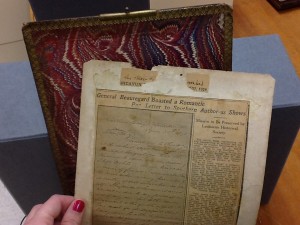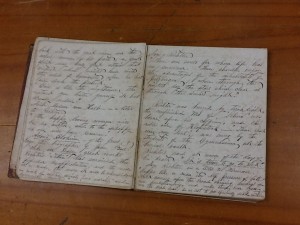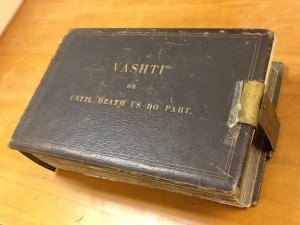By: Tori Linville, UA undergraduate
This poem is part of our fifth pedagogy series. To see Jessica Kidd’s commentary on the class and project, please read the first post from the series or view classmate Jasmine Flowers’ poem.
The Confederacy’s First Lady
I open the file to the information on who I’m to interview.
Augusta Evans Wilson. Author during the Civil War. Quinton is behind this assignment, I know it. He knows I hate the time period. Men bleeding for their warped beliefs. It’s insanity. The smell of gunpowder and sweat is overwhelming. I make a note to assign Quinton to the French Revolution for his next trip.
We discovered this plane of existence a few years after the The Wrinkler was patented after it started bringing the volunteers back in one piece. There were always suspicions about planes of existence parallel to ours, but The Wrinkler brought them to life. Literally.
The only objective is to interview passively, record, and return. Two weeks max to establish background information, locate the subject, and get out.
I am not to engage with the beings on this plane in any other active way. The mission is to pass unnoticed as a news reporter. It’s going to take at least three days to get the clothing right. Tailors in the 1800s are slower than snails.
The individuals within the plane I’m assigned to don’t know they’re not actually within our realm. As time passes, it ripples and some periods get stuck in a loop. Others change altogether. We don’t know why some planes are suspended in certain centuries, while others aren’t even inhabited by humans. We simply don’t have all the answers yet.
Which is where Quinton and I come in. We bring pieces of history back from our assigned planes through the interviews we conduct. The theorists take it from there.
If the mission is successful, I will have received a snapshot of the time period in a way that photographers never could.
Quinton straps me in the machine, securing the seat to my body. They’ve updated The Wrinkler pretty fast to accommodate for our frequent travels. The first Wrinkler was the equivalent of a Porta Potty. Especially after Quinton used it.
We now have our own personal Wrinklers, all sleek and silver elongated pods.
“You ready?”
I nod at him, with narrowed eyes as I lay into my Wrinkler. The door hisses closed after sensing my weight. I’m still trying to pierce Quinton with my glare, and he knows I’m annoyed.
Before the Wrinkler launches, Quinton chuckles with a smile and wiggles his finger in a goodbye.
After doing some background research of Mrs. Wilson, I knew writing a letter wouldn’t be effective. From her old correspondence, she never wrote back in time.
Lifting my skirt, I step up and knock on the door of the Wilson estate. In any other time, the weather would be perfect for a great day at a pool. Instead, I’m swimming in my own sweat, draped in petticoats and heavy in the lower Alabama humidity.
A servant comes to the door. He opens his mouth, but before he can say anything, she cuts in.
“Thank you Charles, you may go.” Nodding his head and looking at the ground, her slave retreats back into the house. “May I help you?”
“Are you Mrs. Augusta Wilson?”
“Yes. What do you need?”
“I’m from the Register. I have a few questions to ask you.”
Transcription of Augusta Evans Wilson interview, 8.4.1869 | 8.4.2183
Your said your letters to Lt. Colonel Curry were often delayed because you were attending to members of your family and friends who were ill. Later, you nursed wounded Confederate soldiers. What were the effects in your role as a caregiver to so many people you knew?
AEW: Your only acquaintance with the Nightingale is during these times. Its song becomes a book end to the lives you see pass before you. Every end teaches you about the fragility of the beginning. Death does not know discrimination. Ladies of Discretion and Soldiers of War begin to blur together. Blood runs with the candle wax. Perspiration is the only constant. The moans and screams are volumes that will always startle you.
I think of my best writing during these times. I suppose my mind grasps for something familiar in the sea of Mortality that sweeps me away into its current. I’ve twisted a soldier on his side so he wouldn’t choke on his own bile. I’ve sewed the ends of limbs that were not there. I’ve shoved intestines back where they belong in a rush for time I no longer had. I’ve witnessed the Fathers of Our Land go insane with suffering.
Too often I was asked by Soldiers to end their pain.
You say slavery has changed the Southern woman and that she no longer gets the proper exercise she needs. You also say that the Southern woman is different from Yankee and English women. Why did you believe these things?

Letter published within a newspaper that was then pasted into the Vashti bound manuscript (MSS 1563)
AEW: The Southern Woman is the chirp of the Cicada after its seventeen years of tranquility. She endures the elements of a land blistered by misunderstanding and ignorant hatred. The application of those of a darker skin is to be workhorses. In our demand for the Labor we are no longer willing to do ourselves, we have begun to lose our own integrity. This Crisis trickles down to the Southern Woman as she is no longer willing to lift her own finger. She maintains her Education, but is not willing to sweep a chimney or churn butter.
These exercises are essential, as I explained to Mr. Curry, because the Southern woman has a unique atmosphere not applicable to anywhere else. Yankee Women and English Women can take their leisurely walks out of doors. These women live in temperate climates that suit their pleasures. These women do not experience the boiling summers that smother our Beloved Lands, that threaten our Ladies with Heat Stroke.
Your brother was part of Bragg’s Army in Tennessee. As a Tenneseean myself, I’m curious as to what you took away from your visit to the state. How did seeing your brother as a soldier change your view of the war and of him?
AEW: The landscape of Tennessee is identical to that of Alabama, excepting the exchange of a sea coast for mountains to the East. Both fly the flag of our Beloved Confederacy with Honor. As we struggle through the battles with the North, we look to our brothers in Tennessee and our other Glorious States for strength and guidance. We are one Breathing Entity, gaining and growing from one another. As we inhale, our brothers exhale. We need not know every aspect of one another to know that our Cause, our purpose rings true.
My little brother was worn with combat as I visited him in Shiloh. He once danced, laughed, and played in our youth. Our relationship was always one of understanding and silent communication. He did not speak much as I sat with him outside his quarters. He did not need to, for I understood his conflict. He suffers, but honors us all by fighting for our nation of Rebels. We do not subscribe to the Northern school of thought, and we never will.
You are often described as a Confederate propagandist. By ending the your engagement to journalist James Reed Spalding because he was a Lincoln supporter, some say you came off as a harsh and staunch Confederate. Do you think this view of you as a person is justified?
AEW: Like a leaf pulverized by a man’s shoe, The Union wishes to crush our Southern voices. By our secession we have individualized ourselves, our nation, our land. The stomach ache of Conformity no longer applies to our cause, as we have Emancipated ourselves. Our endeavor to remain Separate will only be furthered if we stand behind our leaders, like my dear friends Lt. Colonel Curry and General Beauregard.
As for Mr. Spalding, his intentions of marriage were honorable. Yet he was a confused man, and did not have the same beliefs as me, essential to any successful marriage.
Concerning your question of whether the views you mentioned about my person are justified, I ask you to rethink your definition of justice. It is fluid, and ever grey in a black and white society. Mine is only one perspective of the amalgamation of life – noli me tangere.


